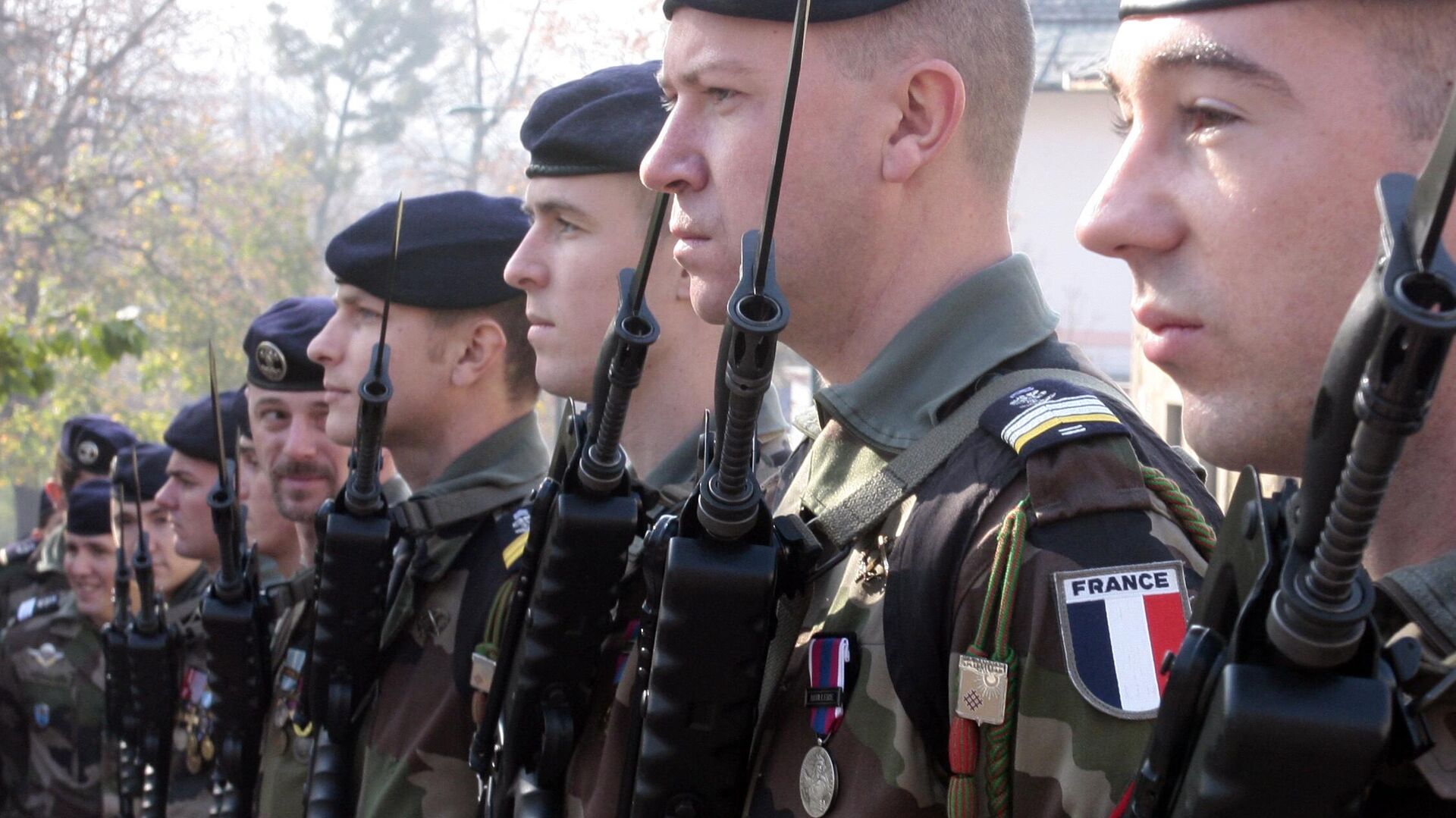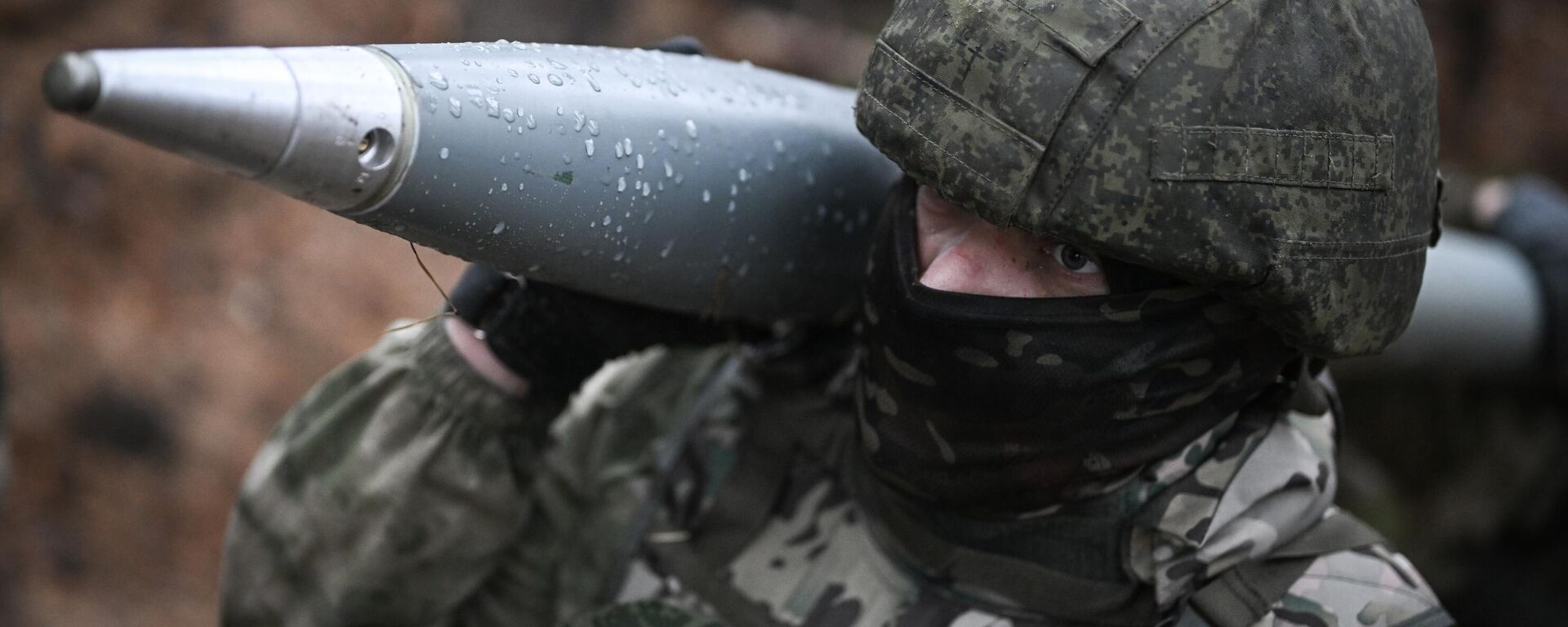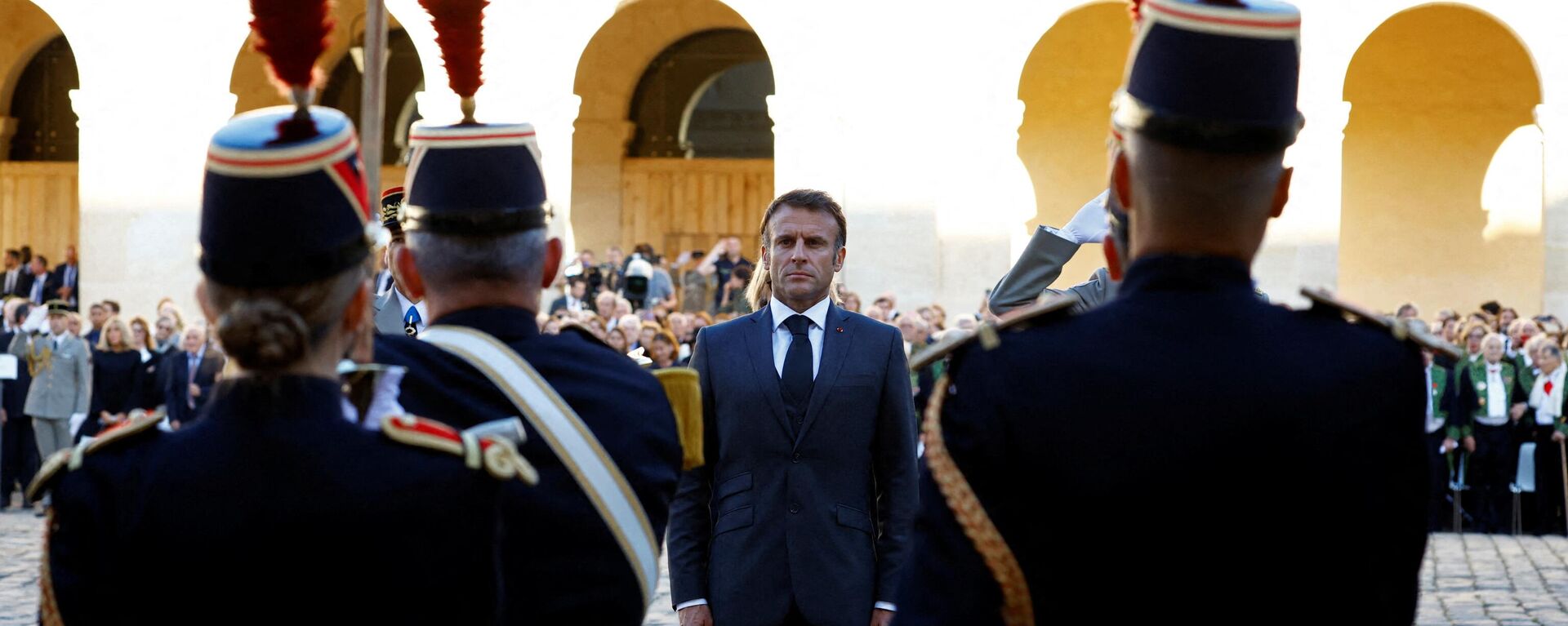https://sputnikglobe.com/20240503/macron-and-camerons-threats-to-flood-ukraine-with-men-and-arms-signs-of-weakness-1118245543.html
Macron and Cameron's Threats to Flood Ukraine With 'Men and Arms': Signs of Weakness?
Macron and Cameron's Threats to Flood Ukraine With 'Men and Arms': Signs of Weakness?
Sputnik International
The recent inflammatory statements by Macron and Cameron were slammed as irresponsible by Russia. Macron again suggested sending NATO troops to Ukraine. Cameron allowed Kiev to use UK-made missiles against any Russian land.
2024-05-03T19:10+0000
2024-05-03T19:10+0000
2024-05-03T19:10+0000
emmanuel macron
david cameron
ukraine
russia
france
nato
islamists
vladimir putin
world
https://cdn1.img.sputnikglobe.com/img/07e8/03/0a/1117236767_0:107:2253:1374_1920x0_80_0_0_f1cf1969a36f4f3837f24984481d05fe.jpg
Foreign Secretary David Cameron said during his visit to Kiev that Ukraine “absolutely has the right” to strike at Russian territory using the weapons made and supplied by the UK. “It is their [Ukrainians] decision about how to use these weapons,” Cameron said.On that issue, Cameron sounded even more aggressive than his American allies, who dissuaded Ukrainians from making strikes against the “old” Russian territory, with the exception of Crimea.Meanwhile, French President Emmanuel Macron repeated his idea (first voiced at the end of February) to send NATO troops to Ukraine. However, in his interview to The Economist, Macron mentioned two conditions for France’s participation: if the frontline of Zelensky’s regime crumbles and if NATO is officially invited by Ukraine.Paolo Raffone, the director of the Brussels-based CIPI Foundation, noted an important development in these comments: the European leaders get more aggressive verbally as their secondary role in the Ukrainian conflict (in comparison to the US, Russia and the Global South) becomes more and more obvious.In response to Cameron’s statement on long-range missiles for Ukraine, the spokeswoman for Russia’s Foreign Ministry Maria Zakharova said that “London should prepare itself” one day to suffer from the strikes from its client – the Ukrainian nationalist regime. She was obviously referring to the case of Washington, which during the infamous terrorist attack in 2001 fell victim from the same Islamists whom America nurtured and supplied with weapons in Afghanistan in the 1980s.Responding to Macron’s idea of sending NATO troops at Kiev’s invitation, Dmitry Peskov, President Putin’s spokesman, called Macron’s statements “important and dangerous.” “Raising the mere possibility of France’s involvement [in the Ukrainian crisis ] is dangerous,” Peskov said.Luckily, Russia is not alone in its appraisal of Macron’s idea to send NATO troops as a roadmap to hell, leading to a direct NATO–Russia war.Giuseppe Conte, a former longtime prime minister of Italy and now the leader of the opposition Five Stars movement, called Macron’s idea “a huge mistake” and spoke out against sending more weapons to Zelensky’s regime in an interview to La7 television channel, since such a policy only postpones the long-awaited negotiations between Moscow and Kiev.For his part, Slovakia’s Prime Minister Robert Fico also critically reacted to Macron’s idea of sending a collective NATO force to Ukraine. Fico reminded that Ukraine is not a member of NATO and that means that individual NATO members have no obligation to send their soldiers to that country.In his interview to The Economist, Macron stressed that he said he “did not exclude” the dispatching of NATO troops to Ukraine, because “Russia also does not exclude anything.” Meanwhile, in his recent interview in March, Putin called the participation of NATO troops in the Ukrainian conflict “a red line” for Russia. He also warned that if the West does not respect this red line, Moscow will not respect any similar lines either.In his interview to Sputnik, Raffone saw in this situation the weakness of both the UK and France. They cannot make decisions on how NATO will proceed in Ukraine. Only the US can take such decisions.“So, any peace agreement can only be negotiated directly between the US and Russia,” Raffone said. “But in this electoral period, it is not possible.”
https://sputnikglobe.com/20240503/mathematics-of-victory-russias-military-edge-over-ukraine-laid-starkly-visible-1118240117.html
https://sputnikglobe.com/20240327/boy-king-who-cried-wolf-macrons-constant-threats-to-send-troops-to-ukraine-signals-weakness-1117585743.html
ukraine
russia
france
Sputnik International
feedback@sputniknews.com
+74956456601
MIA „Rossiya Segodnya“
2024
Dmitry Babich
https://cdn1.img.sputnikglobe.com/img/07e8/02/0e/1116778495_0:120:720:840_100x100_80_0_0_9bf47040bc46073fb920d272be7bc29d.jpg
Dmitry Babich
https://cdn1.img.sputnikglobe.com/img/07e8/02/0e/1116778495_0:120:720:840_100x100_80_0_0_9bf47040bc46073fb920d272be7bc29d.jpg
News
en_EN
Sputnik International
feedback@sputniknews.com
+74956456601
MIA „Rossiya Segodnya“
Sputnik International
feedback@sputniknews.com
+74956456601
MIA „Rossiya Segodnya“
Dmitry Babich
https://cdn1.img.sputnikglobe.com/img/07e8/02/0e/1116778495_0:120:720:840_100x100_80_0_0_9bf47040bc46073fb920d272be7bc29d.jpg
ukrainian conflict, nato troops, western weapons, russia's foreign ministry, terrorists, afghanistan, strikes, reference, emmanuel macron, david cameron
ukrainian conflict, nato troops, western weapons, russia's foreign ministry, terrorists, afghanistan, strikes, reference, emmanuel macron, david cameron
Macron and Cameron's Threats to Flood Ukraine With 'Men and Arms': Signs of Weakness?
French President Emmanuel Macron and the British Foreign Secretary David Cameron made inflammatory statements this week pledging new kinds of military assistance to Ukraine. However, experts see signs of weakness in the two leaders' comments, since neither Paris nor London can “make a difference” in Ukraine.
Foreign Secretary David Cameron said during his visit to Kiev that
Ukraine “absolutely has the right” to strike at Russian territory using the weapons made and supplied by the UK. “It is their [Ukrainians] decision about how to use these weapons,” Cameron said.
On that issue, Cameron sounded even more aggressive than his American allies, who dissuaded Ukrainians from making strikes against the “old” Russian territory, with the exception of Crimea.
“We don’t discuss any caveats that we put on those things… Just as Russia is striking inside Ukraine, you can quite understand why Ukraine feels the need to make sure it has the ability to strike back,” Cameron is quoted by news agencies as saying.
Meanwhile, French President Emmanuel Macron repeated his idea (first voiced at the end of February) to send NATO troops to Ukraine. However, in his interview to The Economist, Macron mentioned two conditions for France’s participation: if the frontline of Zelensky’s regime crumbles and if NATO is officially invited by Ukraine.
Paolo Raffone, the director of the Brussels-based CIPI Foundation, noted an important development in these comments: the European leaders get more aggressive verbally as their secondary role in the Ukrainian conflict (in comparison to the US, Russia and the Global South) becomes more and more obvious.
“Neither the UK nor France or Germany can make any difference in Ukraine,” Raffone stressed. “Europeans follow the US path… and the US set the tune: just keep Ukraine surviving until the US election.”
In response to Cameron’s statement on long-range missiles for Ukraine, the spokeswoman for Russia’s Foreign Ministry Maria Zakharova said that “London should prepare itself” one day to suffer from the strikes from its client – the Ukrainian nationalist regime. She was obviously referring to the case of Washington, which during the infamous terrorist attack in 2001 fell victim from the same Islamists whom America nurtured and supplied with weapons in Afghanistan in the 1980s.
Responding to Macron’s idea of sending NATO troops at Kiev’s invitation, Dmitry Peskov, President Putin’s spokesman, called
Macron’s statements “important and dangerous.” “Raising the mere possibility of France’s involvement [in the Ukrainian crisis ] is dangerous,” Peskov said.
Luckily, Russia is not alone in its appraisal of Macron’s idea to send NATO troops as a roadmap to hell, leading to a direct NATO–Russia war.
Giuseppe Conte, a former longtime prime minister of Italy and now the leader of the opposition Five Stars movement, called Macron’s idea “a huge mistake” and spoke out against sending more weapons to Zelensky’s regime in an interview to La7 television channel, since such a policy only postpones the long-awaited negotiations between Moscow and Kiev.
For his part, Slovakia’s Prime Minister Robert Fico also critically reacted to Macron’s idea of sending a collective NATO force to Ukraine. Fico reminded that Ukraine is not a member of NATO and that means that individual NATO members have no obligation to send their soldiers to that country.
“Anyone can ask us about anything, but I can tell you one thing now: not a single Slovak soldier will cross the border with Ukraine,” Fico is quoted by a Slovak news agency TASR as saying.
In his interview to The Economist, Macron stressed that he said he “did not exclude” the dispatching of NATO troops to Ukraine, because “Russia also does not exclude anything.” Meanwhile, in his recent interview in March, Putin called the participation of
NATO troops in the Ukrainian conflict “a red line” for Russia. He also warned that if the West does not respect this red line, Moscow will not respect any similar lines either.
In his interview to Sputnik, Raffone saw in this situation the weakness of both the UK and France. They cannot make decisions on how NATO will proceed in Ukraine. Only the US can take such decisions.
“So, any peace agreement can only be negotiated directly between the US and Russia,” Raffone said. “But in this electoral period, it is not possible.”





